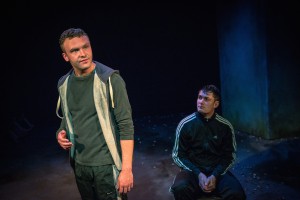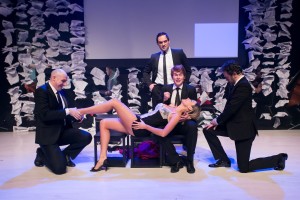Envy is a stupid vice.
Perhaps all vice is. Plato certainly thought so. And he’s not alone.
It’s a common belief that reason and virtue are inextricably linked. To this school of thought, vice is simply the result of faulty thinking.
Envy is usually based on the belief that life is a zero sum game. In other words, your gain is my loss. But is this actually the case? Why would your happiness exclude mine? And, really, how happy could I be if I knew you weren’t?
Peter Schaffer’s Amadeus is a brilliant study of envy, and this production by director Stephen Lloyd-Coombs is terrific.
Salieri, played wonderfully by Nick Hunter, is faced with the phenomenon that is Mozart. To him it is obvious Mozart is the better composer, and it destroys him. The strength of this play is that Salieri is not reduced to mere cattiness. He’s cold and clear. But his envy is convoluted with his concept of justice. Rather than perceiving justice as something human beings must strive to create, Salieri makes the mistake of believing that it’s a quality inherent in the universe. Such a belief is a recipe for tragedy.
Schaffer’s other major theme is genius. Jasper Garner-Gore’s Mozart is eminently watchable, a big likeable child. Salieri can’t help but acknowledge Mozart’s ability, but is shocked to find him so crass. But why? Why should we be all of one piece? (Curiously, it’s the same type of thought structures that won’t separate reason and virtue.)
The concept of ‘genius’ – which is not used in the play – is an intriguing cultural trope. (I call it a trope because it’s not as if there’s a scientific test for it.)
Why do we like the concept of ‘genius’? What is this trope’s purpose? Does it help us relax, by telling us that we can’t possibly compete?
Or is the label an attempt to quarantine our evaluations from the disease of subjectivity? ‘It’s not just my opinion. He was a genius!’
Of course, an important aspect of the story is that Mozart’s ‘genius’ does go unrecognized, except by Salieri. It’s an appealing notion. Who doesn’t want to believe that their own genius has been under-appreciated? (That Mozart’s ‘genius’ did go unrecognized should make us realize that all evaluations are just human, all too human.)
Which leads me to more of my own evaluation.
The leads are supported by great work by the rest of the cast. Nicole Wineberg as Mozart’s wife, Constanze, gives a captivating portrayal of frisky fidelity. Anthony Finch and Claire Stewart-Moore are marvelously flamboyant as Salieri’s spies and representations of malicious triviality. The costumes by Peter Henson and the set by Ashley Bell are a visual delight.
This is a very entertaining and thought-provoking production.
Veronica Kaye
Amadeus by Peter Shaffer
Genesian Theatre
til Nov 29
http://www.genesiantheatre.com.au/




